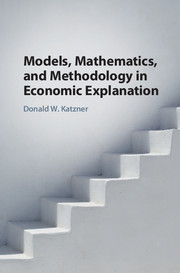Book contents
- Frontmatter
- Dedication
- Contents
- Preface
- Introduction
- 1 Science and Economics
- 2 Economic Models and Explanation
- 3 The Stages of Model Building in Economics
- 4 Models and Mathematics
- 5 Models and Measurement (or Lack Thereof)
- 6 Issues Relating to the Construction of Models from Scratch
- 7 An Example: The Efficiency of Organizational Forms
- 8 The Implicit Assumption Requirements of Later-Stage Model Building
- 9 Ordinality and the Adequacy of Analytic Specification
- 10 Categories of Models
- 11 Conclusion
- Index
2 - Economic Models and Explanation
Published online by Cambridge University Press: 26 October 2017
- Frontmatter
- Dedication
- Contents
- Preface
- Introduction
- 1 Science and Economics
- 2 Economic Models and Explanation
- 3 The Stages of Model Building in Economics
- 4 Models and Mathematics
- 5 Models and Measurement (or Lack Thereof)
- 6 Issues Relating to the Construction of Models from Scratch
- 7 An Example: The Efficiency of Organizational Forms
- 8 The Implicit Assumption Requirements of Later-Stage Model Building
- 9 Ordinality and the Adequacy of Analytic Specification
- 10 Categories of Models
- 11 Conclusion
- Index
Summary
In confluence with the view of philosophers as indicated in the preceding chapter, an important aim of economic science, and that on which attention centers in this volume, is the explanation or clarification of worldly economic phenomena. The discerning of such phenomena could be completed with a single observation at a point in time or require repeated observations over a period of time. It should be noted, however, that in setting out to meet any explanatory aim, the complexity of human affairs is so detailed and extensive that it is beyond the capacity of human beings to explain any economic phenomenon by providing a fully exhaustive description of it. Clearly, then, explanation has to engage in abstraction from the minute particularities of the reality of the phenomenon whose explanation is sought. And this means that explanation of an economic phenomenon requires, at least in part, analysis of it. The explanation that is achieved may or may not carry with it an ability to predict.
Generally, analysis proceeds by organizing and exploring the thoughts one has about the phenomenon at issue. In economics there are a number of routes such organizations and explorations may take. To analyze by example requires the examination of highly detailed specific instances or case studies to illustrate the phenomena under consideration. Another form of analysis, storytelling, is the giving of a narrative account of the phenomena in which ”… fact, theory, and values are all mixed together in the telling.” But the most common method of analysis in economics involves the creation and study of models. And that is the main focus of attention here. It should be noted, however, that in the context of the epistemological considerations of the previous chapter, rationalism, empiricism, and falsificationism may or may not involve model building. Models can be built for different reasons. They may be intended to suggest, according to Aydinonat [1, p. 119] ”… what may be possible in the real world, … show new ways … [to] look at the world, … or help … evaluate the plausibility of … conjectures about the world.” They may be designed to identify the conditions under which certain outcomes might arise [1, p. 163], or the logical possibility of the occurrence of a sequence of observable values over time.
- Type
- Chapter
- Information
- Publisher: Cambridge University PressPrint publication year: 2017



